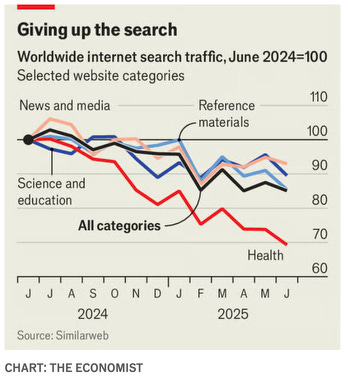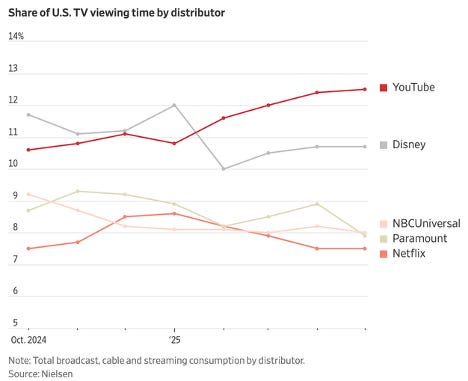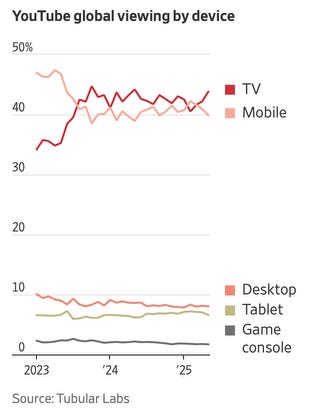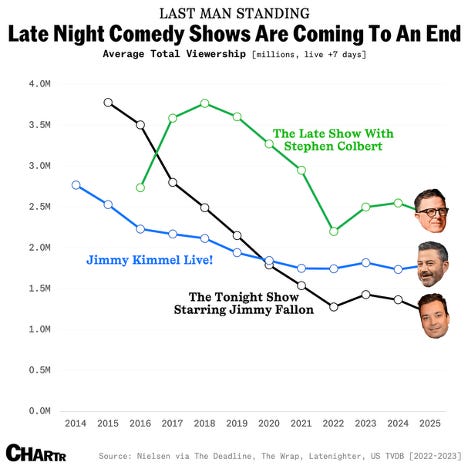11 Things from the week | 21 Jul 25
News from the past week, and a few other things.
1. AI is killing the web. Can anything save it? (Economist)
As AI changes how people browse, it is altering the economic bargain at the heart of the internet. Human traffic has long been monetised using online advertising; now that traffic is drying up. Content producers are urgently trying to find new ways to make AI companies pay them for information. If they cannot, the open web may evolve into something very different.
Since the launch of ChatGPT in late 2022, people have embraced a new way to seek information online. OpenAI, maker of ChatGPT, says that around 800m people use the chatbot. It is the most popular download on the iPhone app store. Apple said that conventional searches in its Safari web browser had fallen for the first time in April, as people posed their questions to AI instead. OpenAI is soon expected to launch a browser of its own. Its rise is so dramatic that a Hollywood adaptation is in the works.
As OpenAI and other upstarts have soared, Google, which has about 90% of the conventional search market in America, has added AI features to its own search engine in a bid to keep up. Last year it began preceding some search results with AI-generated “overviews”, which have since become ubiquitous. In May it launched “AI mode”, a chatbot-like version of its search engine. The company promises that, with AI, users can “let Google do the Googling for you”.
Yet as Google does the Googling, humans no longer visit the websites from which the information is gleaned. Similarweb, which measures traffic to more than 100m web domains, estimates that worldwide search traffic (by humans) fell by about 15% in the year to June. Although some categories, such as hobbyists’ sites, are doing fine, others have been hit hard (see chart). Many of the most affected are just the kind that might have commonly answered search queries. Science and education sites have lost 10% of their visitors. Reference sites have lost 15%. Health sites have lost 31%.
2. Obama on the male malaise: 8 takeaways (Of Boys and Men)
Last week, Barack Obama joined his wife Michelle Obama and brother-in-law Craig Robinson for their podcast, IMO. All the headlines have been about the Obama’s rumored marital issues, which they addressed directly at the top of the show.
But the conversation was actually all about boys and men. The title for the episode was “Focus on What’s Right About Young Men”.
It was a rich and thoughtful conversation. It further widened the permission space to positively address the challenges of boys and men, especially for those on the center-left. In fact, I’d really encourage all of you to watch or listen, but here I’ve summarized what I saw as some of the most important messages, with corresponding excerpts:
1. Progressives need to re-frame their narrative
2. We need more men in the lives of boys
3. Dads rock
4. Spaces for male solidarity are vital
5. We need more boy-friendly education
6. Men being protectors is a good thing
7. Economic structures need fixing, not just men
8. It’s not zero-sum: we rise together
NOTE: It’s worth reading the full article summarizing the podcast (or watching the podcast itself). Longtime readers know I’ve written on this topic previously. I’m encouraged by the continued focus on it from folks on both sides of the aisle.
3. China Gets More Airtime Around the World as Voice of America Signs Off (WSJ)
Trump’s March executive order called for the $900 million media agency, which not only funds VOA but also other media outlets, including Radio Free Asia, to do only the things it was legally required to do. In its wake, China’s perspective on global events has begun to dominate broadcasts around the world. In Thailand, for example, VOA’s regular appearances on the state-owned MCOT broadcaster went to a Chinese media outlet.
In Africa, another Beijing-backed network, CGTN, announced in March that it would expand its operations on the continent, following others that have already increased their reach there. China Radio International, for example, mainly broadcasts in English but has expanded its coverage with some of Nigeria’s widely spoken languages, Hausa, Yoruba and Igbo, to try to reach local audiences.
The departure of Voice of America from Nigeria “created a perceptible void, especially in terms of trusted, independent international news content,” Nigeria’s information minister, Mohammed Idris, said in a written response to questions. While VOA’s coverage emphasized free speech, human rights and open democratic discourse, Chinese media is focused on development success stories, economic cooperation and social stability, he said.
In Ethiopia, Chinese and Ethiopian state media, as well as officials and diplomats from both countries, met in May to promote cooperation between the two countries and launched “China Hour,” a selection of Chinese TV shows, documentaries and cartoons to be broadcast on Ethiopian state television.
4. The U.K. Closed a Tax Loophole for the Global Rich. Now They’re Fleeing. (WSJ)
The U.K. is trying to tax the superrich. It’s off to a bumpy start.
“I’m on my way out,” said Bassim Haidar, a Nigerian-born Lebanese businessman who moved here in 2010. “There comes a time when you don’t feel welcome anymore, and it’s time to just start packing and leaving.”
Haidar is one of the estimated 74,000 who used a centuries-old tax loophole, abolished in April, that catered to the global rich. The nondomiciled—or non-dom status, as it is known—allowed foreigners living in the U.K. to pay tax only on what they earned domestically. Profits made abroad were ignored unless brought into the U.K.
Beset by high public debt and crumbling infrastructure, the U.K. hoped eliminating non-doms would bring in about $45 billion by 2030. But instead of paying up, wealthy expats are rushing for the exits, sparking questions about whether the effort will raise any money at all.
The British experiment has laid bare the difficult politics of taxing the rich. Taxing high earners has become a rallying cry on the left as a solution to income inequality and fraying social-safety nets. Low-tax advocates say taxes on the wealthy are counterproductive, driving away job creators and big spenders.
In the U.S., New York City Democratic mayoral nominee Zohran Mamdani has proposed a “millionaires tax” on New Yorkers making more than $1 million a year, prompting vocal rich people to say they will leave for lower-tax jurisdictions such as Florida or Texas.
One challenge of taxing the wealthy is that they are highly mobile, with houses around the world, private jets and an army of advisers who can sort out visas and bureaucratic paperwork quickly. Jurisdictions such as Dubai, Italy and Monaco have rolled out the red carpet, offering no taxation or structures similar to the U.K.’s old non-dom status.
NOTE: The following is also in England:
5. Want a brand new BMW? Either pay £52k or tell the [Department for Work and Pensions (DWP)] about your mental health (Telegraph)
If you want a brand new BMW i4 M Sport, you have two choices. The first is to lay out the full £52,770. The second is to tell the DWP that your mental health makes it hard to leave the house, claim the enhanced mobility rate of the Personal Independence Payment (Pip), fork out a down payment of £7,999, and get the Government to lease it for you.
In exchange for the mobility component of your benefit, you’ll get a new BMW every three years, your insurance and accident breakdown paid for, your servicing and tyre replacements covered, and your choice of “conventional metallic paint option”.
The only catch is eligibility, but thanks to the soaring growth in sickness benefits claims, that’s less of a barrier than it used to be.
The number of people who could potentially claim a Motability vehicle has risen by over half a million since 2019, and the organisation now has 800,000 clients. The result is a bizarre behemoth: a car-leasing programme for the disabled that accounts for roughly one in every five new cars sold in Britain, and is one of the country’s largest issuers of corporate debt.
6. Obamacare Insurers Seek Double-Digit Premium Hikes Next Year (WSJ)
If you buy your own health insurance, you are probably going to pay more next year—a lot more.
Insurers are seeking hefty 2026 rate increases for Affordable Care Act marketplace plans, the coverage known as Obamacare. Blue Cross & Blue Shield of Illinois wants a 27% hike, while its sister Blue Cross plan in Texas is asking for 21%. The largest ACA plans in Washington state, Georgia and Rhode Island are all looking for premiums to surge more than 20%.
The companies say the big increases are needed because of higher healthcare costs and changing federal policy, including cuts to subsidies that help consumers pay for plans. The higher premiums would come after years of enrollment growth and mostly single-digit rate increases in the Obamacare market, where individuals and families buy insurance for themselves. About 24 million people have ACA plans.
7. How YouTube Won the Battle for TV Viewers (WSJ)
The headquarters of the world’s No. 1 source of video entertainment has none of the trappings of a Hollywood studio. There are no posters of popular shows, no writers pitching ideas, no soundstages and no tourists.
But after pioneering video that we watch on our laptops and phones, YouTube is now the king of Hollywood’s home turf: the TV.
YouTube became the most-watched video provider on televisions in the U.S. earlier this year, and its lead has only grown, according to Nielsen data. People now watch YouTube on TV sets more than on their phones or any other device—an average of more than one billion hours each day. That is more viewing than Disney gets from its broadcast network, dozen-plus cable channels and three streaming services combined.
8. YouTube to demonetize AI-generated videos starting July 15 (Tech Startups)
The era of easy money from AI-generated videos on YouTube may be coming to an abrupt end for millions of creators.
Starting July 15, 2025, YouTube is rolling out a major change that will reshape how creators earn money on the platform. The new policy draws a hard line around what counts as monetizable content, and anything that relies too heavily on automation—or skips the human touch altogether—is getting cut off from ad revenue.
YouTube confirmed the policy shift in an update on its official support site, saying it plans to revise its monetization rules to focus more strictly on what it defines as “original” and “authentic” content. The new guidelines take effect on July 15 and will specifically target videos that YouTube views as mass-produced or repetitive.
9. Colbert Cancellation Exposes the Perilous State of Late-Night TV (WSJ)
“The Late Show with Stephen Colbert” was profitable as recently as a few years ago.
Now, it loses about $40 million a year, according to a person familiar with its budget. On Thursday, CBS PARA 0.39%increase; green up pointing triangle
pulled the plug on the show and an entire franchise launched in 1993, making it the biggest casualty yet among late-night talk shows contending with cord-cutting, changing tastes among younger viewers and declining ad revenue.
The budget for the show, filmed in New York City’s Ed Sullivan Theater, includes a live band, a staff the host said numbered 200 people, and an annual salary of $20 million for Colbert, according to a person familiar with the show’s operations.
That hefty cost of production, a withering business model and a parent company under pressure struck fatal blows. The TV mainstay will go dark next May.
Late-night shows have been one of the most enduring formats in television, with Colbert, Jimmy Fallon and Jimmy Kimmel presiding over newsy monologues and celebrity guests much like their legendary predecessors Jack Paar and Johnny Carson. Into the 2000s, high profit margins and cultural clout helped fuel the so-called late-night wars between David Letterman and Jay Leno as they fought for ratings and high-wattage talent bookings.
Then internet video changed everything. These days, late-night shows are one of the most endangered formats in Hollywood.
10. The Biggest K-Pop Band to Top the Charts Isn’t Even Real (WSJ)
After nearly a decade in a K-pop boy band, Kevin Woo returned home to the U.S. four years ago, looking to expand his musical career outside South Korea. His monthly Spotify listeners, until recently, stood at about 10,000.
Now, it’s around 20 million.
The reason? Netflix’s No. 1 movie globally, “KPop Demon Hunters,” an animated film with girl-group protagonists and boy-band baddies. Two of the film’s tracks have sat atop the U.S. Spotify’s most-streamed songs—feats never before achieved by BTS, Blackpink or any other K-pop group, real or imagined.
That’s delivered a harsh reality to a genre seeking reinvention: Fictional bands have gotten popular faster in the U.S. than humans ever did. The triumph comes as the broader music industry grapples with unconventional entrants, like bogus hits created by AI claiming to be authentic.
11. The Secret to Better Airplane Navigation Could Be Inside the Earth’s Crust (WSJ)
Satellite-based global positioning systems, or GPS, have been the primary method of aerospace navigation for decades. But with GPS jamming and spoofing on the rise, the industry is pushing for an update, and fast.
Now, Airbus’s Silicon Valley-based innovation center, Acubed, and artificial intelligence and quantum-focused Google spinout SandboxAQ are on a mission to demonstrate an alternate way. It involves a small, toaster-size box, lasers, a single GPU chip and a deep knowledge of the Earth’s magnetic field.
The technology, known as quantum sensing, has been in development for decades at a number of companies and is now inching closer to commercialization in aerospace.
Acubed recently took MagNav, SandboxAQ’s quantum-sensing device, on a large-scale test, flying with it for more than 150 hours across the continental U.S. on a general aviation aircraft that Acubed calls its “flight lab.”
MagNav uses quantum physics to measure the unique magnetic signatures at various points in the Earth’s crust. An AI algorithm matches those signatures to an exact location. During the test, Acubed found it could be a promising alternative to GPS in its ability to determine the plane’s location throughout the flights.
Have a great week!
The Curator





